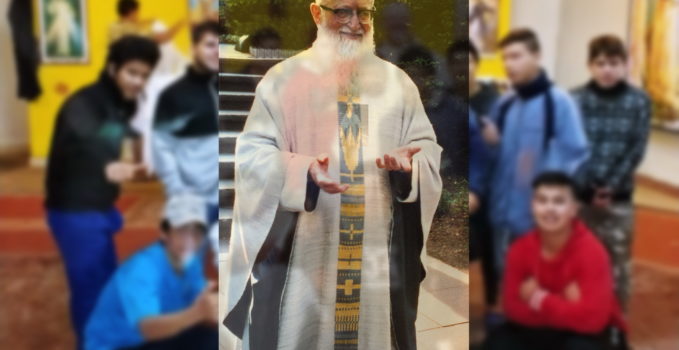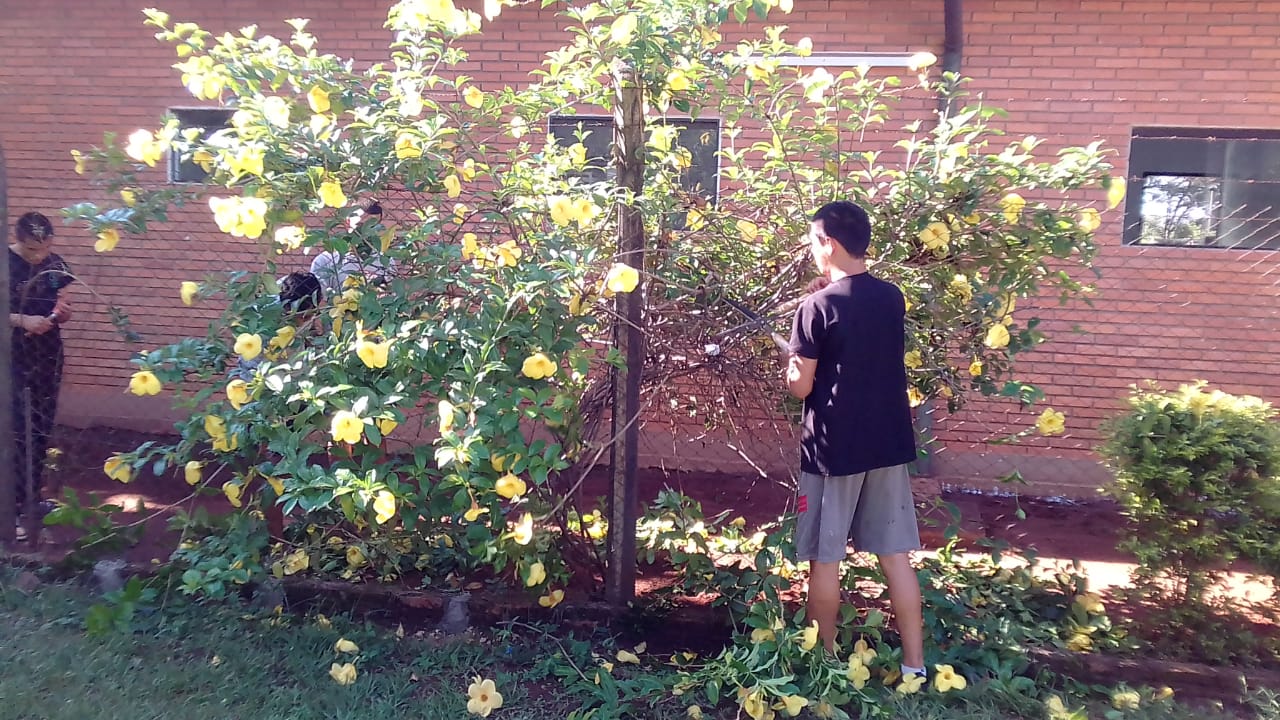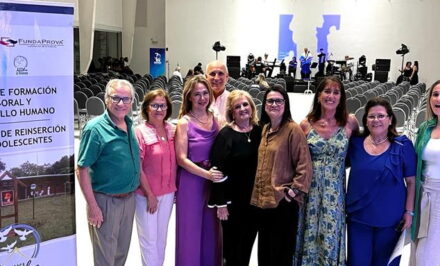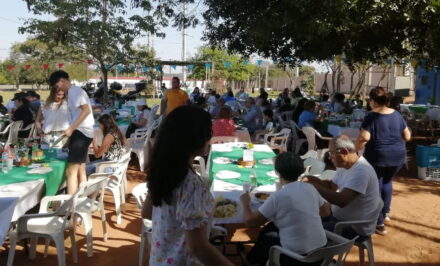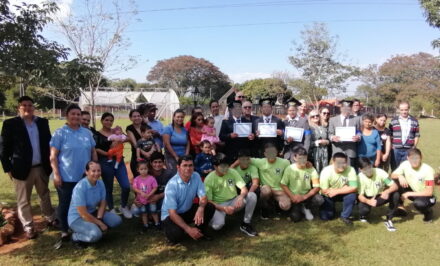Kentenich Pedagogy in the Periphery, Fr. Pedro Kuhlcke •
Freedom in jail? “Yes,” said Father Kentenich. And he would demonstrate it. “Yes,” says Fr. Pedro Kuhlcke and he demonstrated it: in the jail for minors in Itaugua, a few kilometers from the Tupãrenda Shrine. A few months ago, we posed, perhaps, the most daring question on schoenstatt.org: Is Fr. Kentenich’s pedagogy possible on the periphery? Yes, he answers, and he demonstrates it in the jail for minors, in this last part of his reflection in relation to the pedagogy of attachments and covenant pedagogy. If it is possible on the periphery, it should be possible other places too… including within Schoenstatt.—
Pedagogy of attachments
We take one more step! Pedagogy of attachments: there we find all of which we speak about the group, the community. In this world of today in which we live, it is very difficult to be good Christians, to fulfill the commandments and to be children of God, when we are alone and the entire world does the contrary. It is very important to have a group, and to be aware that I am not the only crazy one, different from everyone else, but that we are striving together for these ideals.
What does Father Kentenich tell us?
“Do you understand what is understood by pedagogy of attachments? It is a pedagogy that lends super careful attention to instill the organism of attachments in its totality.”[1]
What is the totality of this organism of attachments? Father Kentenich continues saying: “An organism of natural attachments and an organism of supernatural attachments exists.” Natural: everything that is of this world – supernatural: everything that has to do with Heaven. “Furthermore we can distinguish: first, an attachment to ideas; second, to places, and third, to persons.” In another text, Father Kentenich says:
“According to God’s intention, a child should grow normally in a complete organism of attachments. He has to be introduced and rooted in an attachment to places, persons, and ideas.”[2]
I believe this is the great drama today. Many are born and grow up without attachments and, therefore, are incapable of cultivating attachments. For example, “soap opera love:” the great love, together forever… How long does that “forever” last? Perhaps six months, later the “forever’ is finished. Why? Because there is a lot of instinct, there is a lot of physical relationship, but there is no ability of attachment… I never learned to attach myself because nobody ever attached to me, and I go through the world like a little rubber ball bouncing every which way or tossed into a corner— and in the depth of my soul, a great loneliness.
Then Father Kentenich says that we need to be rooted. What happened to you the first time you entered into the Tupãrenda Shrine? Some of those present responded: I was impacted; I felt peace, tranquility; it is great to be there; I was able to pray like nowhere else… It is what we call the “grace of a home.” One enters the Shrine, and feels happy to be there. I can pray, I can ask for forgiveness, and I feel something heavenly… This is how we begin to attach ourselves to this beautiful place. And even if we live far away and have to take a bus at 7 A.M. in order not be late for the 9 A.M. Mass, we do it! Why? Because almost without noticing it, we begin to attach ourselves to a concrete place where we feel at home. Attachment to places: how happy I am when I feel I have found a home, the Shrine is my home, it is my house, I am no longer like a little rubber ball bouncing around through the world.
Attachment to ideas: “I want to be a good professional, I want to give my children the family I never had, I want to be the best father in the world for my future children.” There I have an idea that gives me strength, my personal ideal— everything we spoke of before.
And also attachment to persons… For example: when one begins to confess with a particular priest, and begins to have confidence, and feels like their heart opens up, and that they can say things they had never said before, and they are happy talking to Priest Oscar [3], and are going to talk to him again, and they begin to make a way and a way to follow: and they begin to be rooted. Or for example, the attachment to one’s own family… One of the youths in jail told me very painfully: “I loved my mother more than anything in the world. When I was 12 years old, my mother died of cancer, and I was left alone. But I always carry her in my heart!” After welcoming the pain and release, one can explain to him: “From Heaven, your mother continues taking care of you and from Heaven she wants to be proud of you.” This attachment to a particular person, in this case to his deceased mother, encourages him to change and to do something.
I would also say, through personal experience: one of the things the boys value most in jail is our coming every Saturday. We have been going to the jail for more than four years without missing a single Saturday – in storms, rain, heat, vacation time; sometimes one misses or the other one cannot make it, but every Saturday we are there. And, of course, we always have to take some snacks, the guitar, and a lot of things to share. Sometimes we have, and sometimes we don’t have. Often I also go during the week, because I can never manage the number of boys that want to talk and go to confession, and there is always the question: “What are you bringing for snack on Saturday?” Then I often joke with them and I tell them: This Saturday we are going to bring hard stale bread [4] with only water because there is no money,” and the boys laugh. But it has already happened several times that they answer me: “It doesn’t matter, Priest! Even if you cannot bring anything, what is important is that you come.” In spite of all these boys have already done, they are often very timid. But sometimes, at the end of our visit, one or another gets the courage to take the microphone and tell us: “On behalf of all of us, I want to thank you because you always come and do not abandon us.”
This is pedagogy of attachments: to give attachments, to give friendship… to know names! It really costs me something to learn names, and in jail there are so many, and there are always new ones. But I made a resolution: I need to learn the names of these boys! When I suddenly greet one of them and I say: “Hello, Victor!” – “Priest, I am not Victor!” [5], he gets somewhat mad, how can it be that the Priest does not know my name? Knowing people personally is so important— the personal attachment. Father talks about this exactly with the pedagogy of attachments.
Did you see how horrible it is when we have a group meeting and three of the members are missing? “We can’t have the meeting because three are missing! For the next meeting, yes oh yes, we all have to be present!” Why? There is already an attachment; we have to be together. But then I tell them: “No, we do not all have to be here! The ones who want to be here have to be here, and even if three are missing, we are going to have the best meeting of the year, and too bad for the three who did not come!” An attachment that is not dependency. That inner freedom is also very important. “We are a group, and we all have to be in everything!” “No, we are a group of free persons that freely chose to be together!” Sometimes, some freely choose to no longer belong, but just the same, we continue being friends and we do not get mad.
In the jail ministry and also here at Mother of Tupãrenda house, we always stress: Our own inner freedom in front of the young people is very important! The only thing we can do is to offer our hand. If a youth wants to take it, it is his decision. If he lets it go, it is his decision. If he wants to return to drugs, if he wants to get lost and destroy himself, it is his decision. But if the young person appears anew and wants to take our hand: here is our hand! Pedagogy of attachments but with great inner freedom.
Father Kentenich also speaks about the “organism of supernatural attachments!” I am not going to extend myself now on this part because I already told you a lot about the importance of all that is religious, “supernatural,” in jail: confessions, the sacraments, Sunday Mass… But a very important part has to do with the last point of our talk:
Covenant pedagogy
OK, that rings a bell with all of you, who do we seal the Covenant with? In the first place, with the Blessed Mother, with Mary!
As I was telling you, in jail, we gave Mary a special title: Mary is “the mother who does not abandon.” We often tell the boys there: “Look at the life of Jesus: Mary was always with her son, she never abandoned him. When he was born, when he grew up, when she educated him… even when she had to challenge him because he stayed in Jerusalem without even sending a message on WhatsApp: ‘Mom, I stayed in the temple’ – see how Mary had no problem challenging him: ‘Your father and I have been searching for you for three days!’ but always with great love but also with firmness. Also in one of the very tender moments in the life of Jesus when he enjoyed the wedding feast at Cana: Mary was there. And in the most difficult moment, when dying on the cross, and almost all of his friends had abandoned him, his Mother, Mary, was there. Mary never abandoned her son, Jesus!”
The youths in jail love to hear that. Many of them suffered a great deal of abandonment: the father who was never present; the mother who went to work in Spain and never returned. Or the mother who got together with the latest boyfriend and the relationship with that “stepfather” never worked out, then the mother threw the son out of the house… Or the mother who died. Or the mother who was an adolescent drug addict, had her child, and never took responsibility for him. – A great deal of pain, a great deal of absence, a great deal of loneliness! There covenant pedagogy means being able to tell them: “You have a mother in Heaven, a mother who is always there, a mother who never abandons you! Every night you can ask her for a hug, an embrace. And every evening and every morning you can ask her to educate you to be a good son of God. And you can always offer her your effort to change: ‘Mother Mary, today I am not going to participate in any of my vices!”
When the youths finally get out of jail and some of them come to Mother of Tupãrenda house, they really like for us to go on Tuesdays to celebrate Mass in the Shrine. One Tuesday, I don’t know why, everything got behind, and I said: “OK, we do not have time to celebrate Mass at the Shrine, let’s go and pray for a while at the Wayside Shrine of Casa Madre.” One of the boys almost got mad: “No, I do not want to pray here, I want to go to the Shrine,” and he did not pray. Why? Because an attachment to the Blessed Mother in the Shrine had grown in him. Perhaps those boys will never seal the covenant formally kneeling in the Shrine with a black suit and red tie of the Boys’ Youth, but there is a Covenant!
OK then, Schoenstatt pedagogy, is just purely a theory? Or is it worthwhile to know it more in depth? Does it have something to do with our reality? Was Father Kentenich a genius? Things that he already said more than 80 years ago, we are living today. Things that perhaps nobody before him presented in this form – and we are the privileged ones to be able to live all of this! So when you have a lot of money and a lot of time, buy this book, the “Pedagogical Texts,” study it and apply the pedagogy of Father Kentenich, it is worthwhile!
[1] King, 433. There also the following two quotes.
[2] King, 445
[3] Leader of the Boys’ Youth in Tupãrenda
[4] Old and hard bread
[5] “I am not Victor!”
Original Spanish: 1 June 2019. Translation: Carlos Cantú, Austin, Texas USA. Edited: Melissa Peña-Janknegt, Elgin, TX USA
SOS Casa Madre de Tupãrenda – Let us safeguard the first opportunity of 22 youngsters, now!


